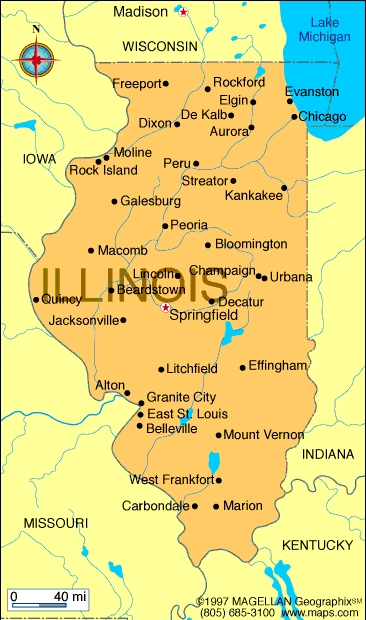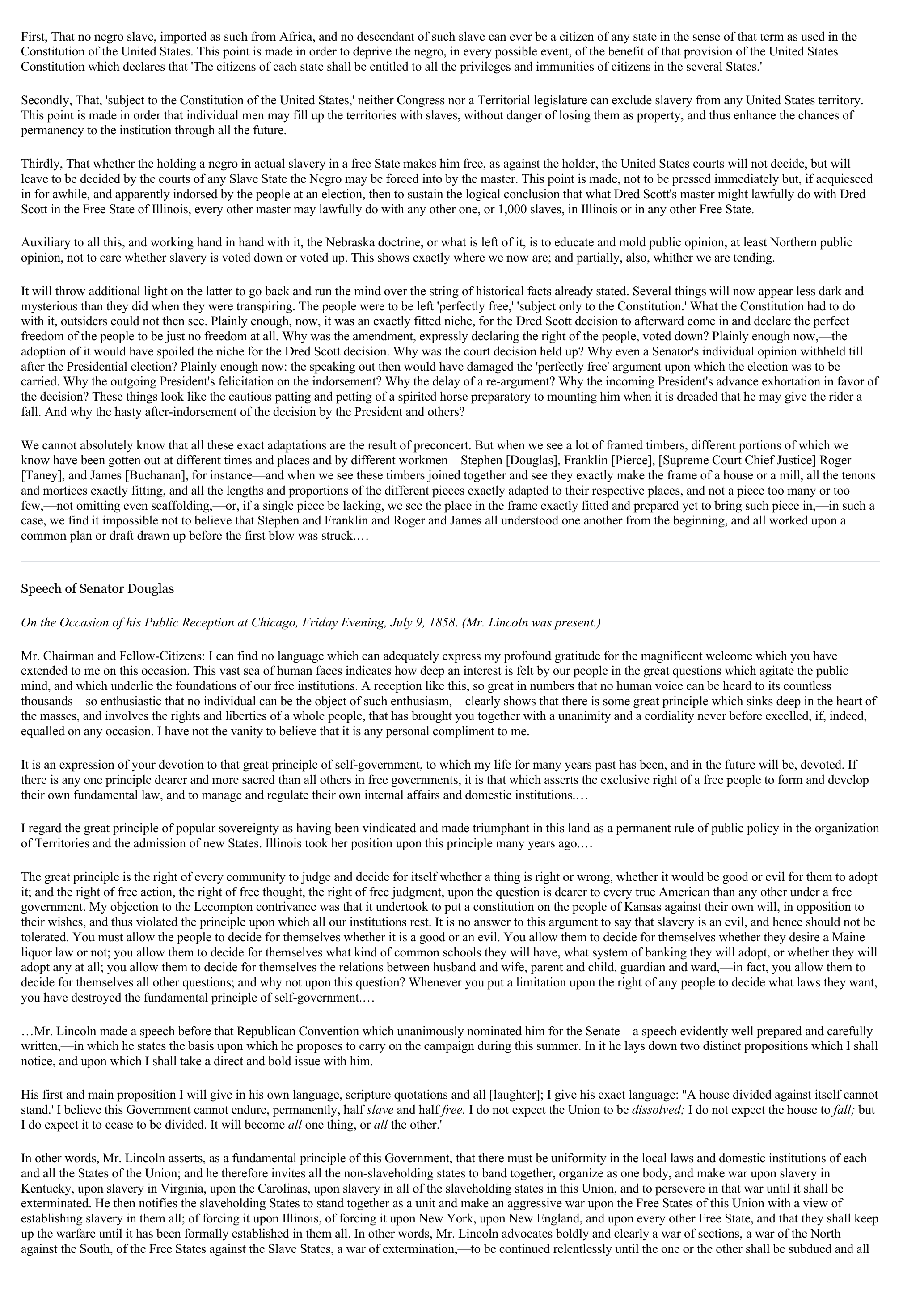Lincoln: "A House Divided" At the 1858 state Republican convention in Springfield, Illinois, the Republican Party's United States Senate candidate for Illinois and future president Abraham Lincoln delivered his famous "House Divided" speech.
Publié le 26/05/2013

Extrait du document


«
First, That no negro slave, imported as such from Africa, and no descendant of such slave can ever be a citizen of any state in the sense of that term as used in theConstitution of the United States.
This point is made in order to deprive the negro, in every possible event, of the benefit of that provision of the United StatesConstitution which declares that 'The citizens of each state shall be entitled to all the privileges and immunities of citizens in the several States.'
Secondly, That, 'subject to the Constitution of the United States,' neither Congress nor a Territorial legislature can exclude slavery from any United States territory.This point is made in order that individual men may fill up the territories with slaves, without danger of losing them as property, and thus enhance the chances ofpermanency to the institution through all the future.
Thirdly, That whether the holding a negro in actual slavery in a free State makes him free, as against the holder, the United States courts will not decide, but willleave to be decided by the courts of any Slave State the Negro may be forced into by the master.
This point is made, not to be pressed immediately but, if acquiescedin for awhile, and apparently indorsed by the people at an election, then to sustain the logical conclusion that what Dred Scott's master might lawfully do with DredScott in the Free State of Illinois, every other master may lawfully do with any other one, or 1,000 slaves, in Illinois or in any other Free State.
Auxiliary to all this, and working hand in hand with it, the Nebraska doctrine, or what is left of it, is to educate and mold public opinion, at least Northern publicopinion, not to care whether slavery is voted down or voted up.
This shows exactly where we now are; and partially, also, whither we are tending.
It will throw additional light on the latter to go back and run the mind over the string of historical facts already stated.
Several things will now appear less dark andmysterious than they did when they were transpiring.
The people were to be left 'perfectly free,' 'subject only to the Constitution.' What the Constitution had to dowith it, outsiders could not then see.
Plainly enough, now, it was an exactly fitted niche, for the Dred Scott decision to afterward come in and declare the perfectfreedom of the people to be just no freedom at all.
Why was the amendment, expressly declaring the right of the people, voted down? Plainly enough now,—theadoption of it would have spoiled the niche for the Dred Scott decision.
Why was the court decision held up? Why even a Senator's individual opinion withheld tillafter the Presidential election? Plainly enough now: the speaking out then would have damaged the 'perfectly free' argument upon which the election was to becarried.
Why the outgoing President's felicitation on the indorsement? Why the delay of a re-argument? Why the incoming President's advance exhortation in favor ofthe decision? These things look like the cautious patting and petting of a spirited horse preparatory to mounting him when it is dreaded that he may give the rider afall.
And why the hasty after-indorsement of the decision by the President and others?
We cannot absolutely know that all these exact adaptations are the result of preconcert.
But when we see a lot of framed timbers, different portions of which weknow have been gotten out at different times and places and by different workmen—Stephen [Douglas], Franklin [Pierce], [Supreme Court Chief Justice] Roger[Taney], and James [Buchanan], for instance—and when we see these timbers joined together and see they exactly make the frame of a house or a mill, all the tenonsand mortices exactly fitting, and all the lengths and proportions of the different pieces exactly adapted to their respective places, and not a piece too many or toofew,—not omitting even scaffolding,—or, if a single piece be lacking, we see the place in the frame exactly fitted and prepared yet to bring such piece in,—in such acase, we find it impossible not to believe that Stephen and Franklin and Roger and James all understood one another from the beginning, and all worked upon acommon plan or draft drawn up before the first blow was struck.…
Speech of Senator Douglas
On the Occasion of his Public Reception at Chicago, Friday Evening, July 9, 1858 .
(Mr.
Lincoln was present.)
Mr.
Chairman and Fellow-Citizens: I can find no language which can adequately express my profound gratitude for the magnificent welcome which you haveextended to me on this occasion.
This vast sea of human faces indicates how deep an interest is felt by our people in the great questions which agitate the publicmind, and which underlie the foundations of our free institutions.
A reception like this, so great in numbers that no human voice can be heard to its countlessthousands—so enthusiastic that no individual can be the object of such enthusiasm,—clearly shows that there is some great principle which sinks deep in the heart ofthe masses, and involves the rights and liberties of a whole people, that has brought you together with a unanimity and a cordiality never before excelled, if, indeed,equalled on any occasion.
I have not the vanity to believe that it is any personal compliment to me.
It is an expression of your devotion to that great principle of self-government, to which my life for many years past has been, and in the future will be, devoted.
Ifthere is any one principle dearer and more sacred than all others in free governments, it is that which asserts the exclusive right of a free people to form and developtheir own fundamental law, and to manage and regulate their own internal affairs and domestic institutions.…
I regard the great principle of popular sovereignty as having been vindicated and made triumphant in this land as a permanent rule of public policy in the organizationof Territories and the admission of new States.
Illinois took her position upon this principle many years ago.…
The great principle is the right of every community to judge and decide for itself whether a thing is right or wrong, whether it would be good or evil for them to adoptit; and the right of free action, the right of free thought, the right of free judgment, upon the question is dearer to every true American than any other under a freegovernment.
My objection to the Lecompton contrivance was that it undertook to put a constitution on the people of Kansas against their own will, in opposition totheir wishes, and thus violated the principle upon which all our institutions rest.
It is no answer to this argument to say that slavery is an evil, and hence should not betolerated.
You must allow the people to decide for themselves whether it is a good or an evil.
You allow them to decide for themselves whether they desire a Maineliquor law or not; you allow them to decide for themselves what kind of common schools they will have, what system of banking they will adopt, or whether they willadopt any at all; you allow them to decide for themselves the relations between husband and wife, parent and child, guardian and ward,—in fact, you allow them todecide for themselves all other questions; and why not upon this question? Whenever you put a limitation upon the right of any people to decide what laws they want,you have destroyed the fundamental principle of self-government.…
…Mr.
Lincoln made a speech before that Republican Convention which unanimously nominated him for the Senate—a speech evidently well prepared and carefullywritten,—in which he states the basis upon which he proposes to carry on the campaign during this summer.
In it he lays down two distinct propositions which I shallnotice, and upon which I shall take a direct and bold issue with him.
His first and main proposition I will give in his own language, scripture quotations and all [laughter]; I give his exact language: ''A house divided against itself cannotstand.' I believe this Government cannot endure, permanently, half slave and half free. I do not expect the Union to be dissolved; I do not expect the house to fall; but I do expect it to cease to be divided.
It will become all one thing, or all the other.'
In other words, Mr.
Lincoln asserts, as a fundamental principle of this Government, that there must be uniformity in the local laws and domestic institutions of eachand all the States of the Union; and he therefore invites all the non-slaveholding states to band together, organize as one body, and make war upon slavery inKentucky, upon slavery in Virginia, upon the Carolinas, upon slavery in all of the slaveholding states in this Union, and to persevere in that war until it shall beexterminated.
He then notifies the slaveholding States to stand together as a unit and make an aggressive war upon the Free States of this Union with a view ofestablishing slavery in them all; of forcing it upon Illinois, of forcing it upon New York, upon New England, and upon every other Free State, and that they shall keepup the warfare until it has been formally established in them all.
In other words, Mr.
Lincoln advocates boldly and clearly a war of sections, a war of the Northagainst the South, of the Free States against the Slave States, a war of extermination,—to be continued relentlessly until the one or the other shall be subdued and all.
»
↓↓↓ APERÇU DU DOCUMENT ↓↓↓
Liens utiles
- Lincoln: "The Monstrous Injustice of Slavery" Abraham Lincoln had settled into his Illinois law practice in 1854 when the United States Congress passed the Kansas-Nebraska Act.
- Abraham Lincoln I INTRODUCTION Abraham Lincoln (1809-1865), 16th president of the United States (1861-1865) and one of the great leaders in American history.
- The Emancipation Proclamation Issued by President Abraham Lincoln on January 1, 1863, this famous document, printed here in its entirety, granted freedom to more than 3 million United States slaves.
- Franklin Roosevelt's Pearl Harbor Speech In this famous speech, President Franklin Delano Roosevelt lists the unprovoked attacks by Japan and details America's reasons for declaring war.
- The Monroe Doctrine In his annual message to Congress in 1823, United States president James Monroe declared that the United States had the right to exclude foreign powers from colonizing in the western hemisphere.







